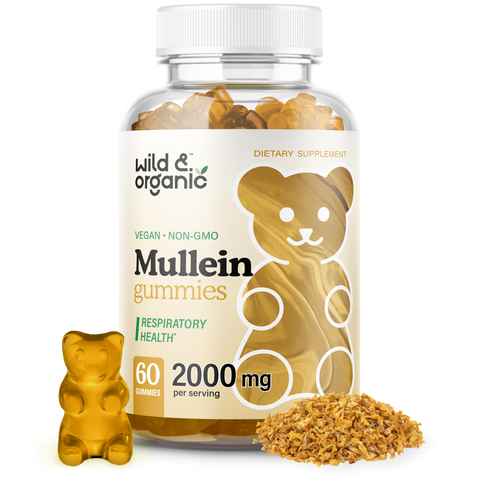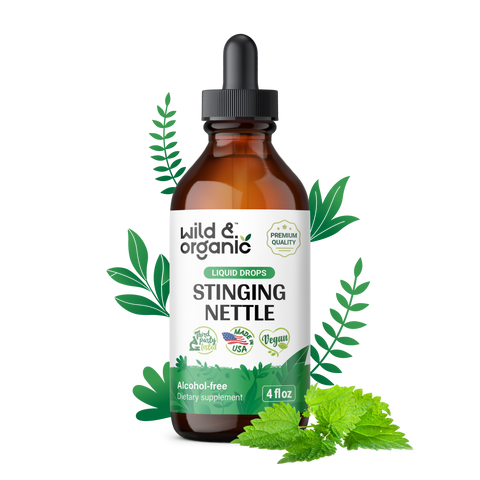Allergies can turn our daily routines upside down with a relentless series of sneezes, watery eyes that won't quit and maddening itch that seems to take over your entire being. The impact of allergies extends beyond physical discomfort, affecting emotional health and quality of life, thereby highlighting the critical need for effective management strategies.
This article serves as a comprehensive guide, shedding light on the essence of allergies, their common triggers and the profound effect they have on individuals' daily lives. More importantly, it underscores the significance of adopting natural management strategies to mitigate their impact. Through an informed approach, individuals can navigate the challenges posed by allergies more effectively, fostering a healthier, more comfortable living environment free from the constraints of allergic reactions.
Understanding Allergies: Mechanisms, Types and Impact on the Body
Allergies occur when the immune system has a hyperreactive response to substances that are typically harmless to most individuals. These substances, or allergens, can include pollen, dust mites, pet dander, mold, certain foods, insect stings and medications. When a person with an allergy comes into contact with an allergen, their immune system perceives it as a threat. It becomes overactive and produces antibodies called Immunoglobulin E (IgE). This reaction is part of the body's attempt to protect itself from what it mistakenly identifies as harmful.
The interaction between IgE antibodies and the allergen leads to the release of various chemicals in the body, with histamine being the most notable. Histamine and other chemicals cause various allergy symptoms, such as:
- Nasal symptoms: Sneezing, runny or blocked nose (allergic rhinitis)
- Eye symptoms: Red, watery, itchy eyes (allergic conjunctivitis)
- Skin symptoms: Rashes, hives, eczema or contact dermatitis
- Respiratory symptoms: Wheezing, coughing, shortness of breath and chest tightness, particularly in asthma triggered by allergies
- Gastrointestinal symptoms: Nausea, vomiting, diarrhea and abdominal pain, especially in food allergies
In some cases, allergies can lead to a severe, life-threatening reaction known as anaphylaxis. Anaphylaxis is a rapid onset allergic reaction that can affect multiple systems in the body simultaneously, leading to symptoms such as difficulty breathing, swelling of the throat and tongue, a sudden drop in blood pressure and loss of consciousness. Given this, it is highly important to identify your triggers! Undergoing allergy testing can significantly empower you to identify and steer clear of substances that may pose a risk to your health, thereby enabling you to develop a comprehensive and effective strategy for prevention and treatment.
Seasonal Allergy
Seasonal allergies are otherwise known as pollen allergies or hay fever. They usually occur during specific times of the year when trees, grasses and weeds release tiny pollen particles into the air to fertilize other plants.
The body's immune system typically protects against harmful substances such as bacteria and viruses. However, in individuals with pollen allergy, the immune system mistakenly identifies pollen particles as harmful invaders and becomes overactive. It produces Immunoglobulin E (IgE) antibodies which eventually leads to the release of histamine and other chemicals from cells in the nasal passages, eyes and other parts of the body.
Seasonal allergy symptoms usually include:
- Sneezing
- Runny or stuffy nose
- Itchy, watery, red eyes
- Itchy throat or ear canals
- Postnasal drip
- Cough
- Fatigue and irritability
- Swollen, blue-colored skin under the eyes (allergic shiners)
The severity of pollen allergy symptoms can vary widely among individuals. For some, they can be a minor annoyance, causing mild symptoms as the allergy season approaches. For others, the symptoms can be severe and significantly impair daily activities, sleep and overall quality of life. In certain cases, seasonal allergies can also exacerbate asthma, leading to more serious respiratory problems.
Food Allergy
This type of allergy occurs when the immune system mistakenly identifies a protein found in the food as harmful. This reaction triggers an immune response to defend against this supposed threat. Unlike food intolerances, which affect the digestive system and can cause discomfort, food allergies involve the immune system and can lead to more severe health consequences.
Individuals with food allergy can experience various symptoms, with hives or a skin rash being the most common. Furthermore, they experience digestive issues, such as diarrhea, stomach cramps or vomiting. Swelling of the lips, tongue, throat, face or other parts of the body, itching or tingling in or around the mouth are also prevalent. In more severe cases, food allergy can lead to trouble breathing, dizziness, lightheadedness, fainting and even anaphylaxis.
Pet Allergy
Animal’s skin cells, urine or saliva contain proteins which can trigger an allergic reaction in some individuals. What’s more interesting, this type of allergy does not necessarily manifest from birth or early childhood. They can develop at any point in a person's life, even after many years of living with beloved pets without any allergic symptoms! This phenomenon underscores the dynamic nature of the immune system and its capacity to change over time. The exact reasons why some individuals develop allergies later in life while others do not are complex and not fully understood. Probably, with continuous or repeated exposure to pet allergens, the immune system may at some point recognize these substances as harmful.
Symptoms of a pet allergy can vary in severity and often affect the respiratory system and skin. Individuals may experience sneezing, runny or stuffy nose, itchy, red or watery eyes and coughing. Some may also suffer from skin reactions like eczema or hives upon touching an animal.
Drug Allergy
A drug allergy is an adverse reaction of the immune system to a specific medication. Unlike side effects, drug allergies are unpredictable. This immune response can happen with any type of medication, whether it's prescription, over-the-counter or herbal.
Symptoms of a drug allergy can range from mild to severe and may include:
- Skin rashes or hives
- Itching
- Fever
- Swelling of the lips, tongue or face
- Wheezing or difficulty breathing
- Anaphylaxis, a severe, life-threatening reaction that can include a drop in blood pressure, difficulty breathing and loss of consciousness.
Natural Allergy Relief Strategies: Reclaiming Your Joy
Allergies doesn't mean we must resign ourselves to a life of constant discomfort! This guide is dedicated to unveiling natural allergy relief strategies that promise a gentler, yet effective, approach to managing allergic reactions. By exploring these natural remedies and preventive measures, individuals can bring back the joy of life, minimizing the impact of allergies.
Know Your Triggers
Identifying the specific triggers of your allergies is a foundational step toward effective natural allergy relief. This knowledge not only empowers you to avoid or minimize exposure to these triggers but also enables you to tailor their allergy management strategies more effectively.
By accurately identifying your allergens, you can adopt specific avoidance strategies. They can include staying indoors on high pollen days, removing allergen-accumulating items from your home or modifying your diet to exclude allergenic foods. Furthermore, knowing your triggers can help healthcare providers recommend targeted treatments which can decrease your sensitivity to allergens over time.
Clean Your Environment Regularly
Regular cleaning plays a pivotal role in reducing allergens within the home environment. Allergens such as dust mites, pet dander, pollen and mold thrive in various household surfaces and textiles, as well as in the air. By adhering to a consistent cleaning routine, individuals can significantly diminish the presence of these allergens, thereby mitigating the frequency and severity of allergic reactions.
- Use a HEPA filter vacuum: HEPA filters can trap fine particles such as pollen, pet dander and dust mites, preventing them from being recirculated into the air.
- Microfiber cloths: These cloths are effective at capturing dust without spreading it into the air, unlike traditional dusters.
- Reduce humidity: Using dehumidifiers in damp areas of the home can inhibit mold growth and dust mite populations.
- Air purifiers: Air purifiers with HEPA filters can remove airborne allergens from indoor air, providing additional relief.
Utilize Allergen-Proof Beddings
Allergen-proof beddings are designed to serve as a barrier between the person and the common allergens that tend to accumulate in mattresses, pillows and bedding. These specialized covers are made from tightly woven fabric. Their structure doesn’t let dust mites, pet dander, pollen and other allergens penetrate the surface where they can directly contact the skin and respiratory system.
Regular bedding, no matter how frequently washed, can still accumulate allergens within the fibers and filling materials. In contrast, allergen-proof beddings ensure that these irritants are kept at bay. This is a good way to ensure a cleaner and more hypoallergenic sleeping environment!
For individuals suffering from allergies, these allergen-proof beddings can be a game-changer. It can lead to a noticeable reduction in nighttime symptoms such as sneezing, nasal congestion and itchy eyes, contributing to a more restful sleep and improved overall well-being.
Try Air Filters and Purifiers
These devices are designed to remove airborne particles. They reduce the amounts of pollen, dust mites, pet dander and mold spores. This helps alleviate allergy symptoms and create a healthier living space.
Air purifiers have the ability to filter and trap tiny particles that traditional cleaning methods might miss. High-Efficiency Particulate Air (HEPA) filters, in particular, are highly efficient at capturing tiny particles. This capability makes HEPA air purifiers a valuable tool for individuals with allergies, as they can significantly reduce the amount of airborne allergens circulating within a room.
Utilizing air filters and purifiers can be particularly beneficial in bedrooms or living areas, where allergen exposure is usually higher. And this is where individuals spend a considerable amount of time.
Consider Natural Supplements for Allergy Relief
Organic anti-allergy supplements offer a complementary approach to manage allergies and support the immune system. Herbs like mullein, astragalus, stinging nettle, along with compounds such as quercetin and bromelain, have been used traditionally to alleviate allergic reactions and reduce related discomfort.
Consult a Healthcare Provider
A healthcare provider can conduct a thorough assessment to accurately diagnose the type of allergies you have and identify the specific allergens causing your symptoms. This personalized approach is essential for crafting an effective allergy management plan. Without a clear understanding of your allergens, attempting to relieve symptoms through natural means might be hit or miss.
Allergy management is often an ongoing process that requires adjustments over time. A healthcare provider can monitor your progress and make necessary adjustments to your treatment plan. This is crucial for ensuring that the strategies you're employing continue to provide relief and that any new symptoms or health concerns are promptly addressed.
Final Thoughts
Allergies impact millions of individuals across the globe. They often disrupt daily activities and prevent people from enjoying life to its fullest. However, it's important to remember that this situation is not immutable. You have the power to change the narrative of your allergy experience! By adopting natural anti-allergy strategies you can reclaim the joy and freedom that allergies have overshadowed.
These natural approaches offer a holistic way to address allergies, focusing not only on symptom relief but also on enhancing your overall health and well-being. It's a journey towards creating a harmonious living environment, both internally and externally, where allergies no longer dictate the terms of your daily life.
Why Choose Our Natural Allergy Supplements?
When it comes to managing allergies, choosing the right support can make all the difference. Our natural allergy supplements stand out as an ideal choice for those seeking relief from the discomfort caused by allergies. Crafted from carefully selected, high-quality natural ingredients, each product offers a comprehensive solution to allergy sufferers.






